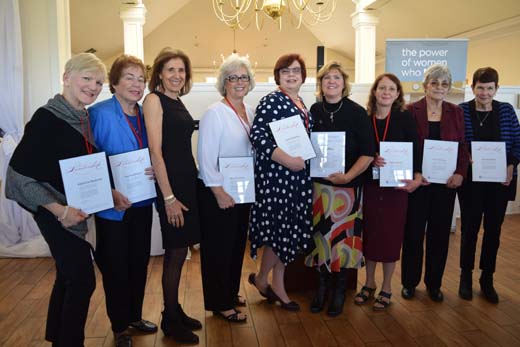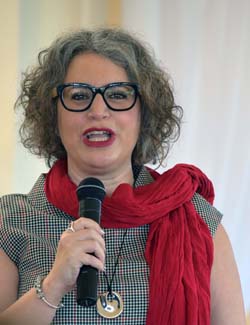
Hadassah celebrates its ‘Women of Excellence’
By Donald H. Harrison


SAN DIEGO –Dafna Michaelson Jenet, an author and Colorado state legislator, perhaps felt that she was preaching to the choir when she addressed the San Diego area contingent of Hadassah Southern California on the issue of community problem solving. In 2009, she had traveled to all 50 states to meet men and women who were community problem solvers. About 60 percent of the 500 people she interviewed were women, and at least a plurality of those women were Jewish. Solving problems, she exclaimed in her Sunday luncheon talk in the clubhouse of the Carmel Mountain Ranch Estate, is what Jewish women do! In the book, It Takes A Little Bit of Crazy, which won an International Book Award in the social change category, Jenet describes her journey.
Proof of her point about Jewish women came later in the program when nine Hadassah members were honored for their work in the organization that not only raises funds for the Hadassah hospitals in Jerusalem, but also helps educate women in this country about women’s heart health and the scourge of human trafficking, among numerous other topics.
Co-President Lori Good emceed the program that recognized honorees from eight local Hadassah units as well as Audrey Levine, the organization’s outgoing co-president for the San Diego area. The other awardees and their Hadassah units were Antonia Martin, Attorneys Council; Wendie Sandvik, Bat Harim; Naomi Blyveis, Bath Shemesh Group; Katherine Backman, Chofit Group; Sue Appelbaum, Galilee Group; Ilene Bernstein, Hatikvah of the Inland Empire; Ellie Greenberg, Shoshanah Group; and Joan Rosenberg, Yachad Group.
Rather than summarize her findings in the book, which she later autographed for purchasers, Jenet told of the milestones in her own life that led to the 50-state journey, her second marriage, and to gaining celebrity status, which she later parlayed into her election in 2016 as a Democrat to the Colorado Legislature.
After her divorce from her first husband, she said, she was in tough financial straits. She had household bills to pay, two children in private schools, and a vanishing bank account. A new boyfriend, Michael, came both to her financial and emotional aid. One day, when a lottery jackpot was in the mega-millions, they talked about purchasing a lottery ticket. Dafna said she froze, remembering how her parents, who were relatively impoverished, used to buy lottery tickets and plan together for the wonderful things that never happened. Accordingly, Dafna did not want to buy a ticket, but she told Michael that he should go ahead, which he did. He told her that the ticket belonged to both of them, and asked what they should do with the winnings. Allowing herself to fantasize, she said she would like to meet the governors of all 50 states to urge them to reach out more to community problem solvers.
Well, they didn’t win the lottery, but Dafna’s dream was born. She decided that there was no point meeting the governors—without money to contribute to them, they probably wouldn’t be interested in what she had to say anyway. Instead, she decided she would seek to meet an average of 10 problem solvers per state to learn their stories. She formed a non-profit organization which sought both financial and in-kind contributions to facilitate the trip. Often, she slept over in the homes of interviewees. People who didn’t have cash contributed air miles and automobile miles to help her on her national tour. But around the 25th state that she visited – which was California – the money was running out, and discouraged, Dafna considered ending the project.
Michael, to whom she was not yet married, took her face in his hands, and told her, “We don’t quit!,’” restoring her resolve to somehow go on with the journey. Just four days later she received a telephone call from a representative of Oprah Radio, who asked if she would be willing to be interviewed by the poet Maya Angelou. “I was in awe,” the author commented. “She called me her kindred spirit!”
So, the interviews continued, her interviewees coming from many walks of life and from the full spectrum of financial circumstances, “from homeless to multi-billionaires.” Other major media decided to publicize her project, which became a cause célèbre. When she flew to Hawaii, boyfriend Michael Jenet joined her, and on the beach, he sunk to one knee and proposed marriage. Once again, Dafna said she became frozen. Here was a man who had rescued her both financially and emotionally, who was the rock upon which she leaned. She knew that she loved him, but she also knew that because Michael was not Jewish her Orthodox parents might disown her. But after a moment’s reflection, she decided she must follow her heart. She said “yes.”
When her mother heard the news, she said she would sit “shiva” for her – the equivalent of mourning for someone who is dead. If that’s the case, responded Dafna, grandma would never see her grandchildren again. “Never mind!” responded her mother, quickly acquiescing to the new situation. Dafna’s own grandparents similarly came around, but some of her siblings continue to have problems with Dafna having married “out.”
Dafna and Michael were married in 2011, and after a while, she became pregnant, but then had a miscarriage. Whereas Judaism has rituals for almost everything – take Chanukah which we are now celebrating, or the seders at the Pesach table – there are no rituals for mourning a child who never was born. In another of her books, Peanut’s Legacy, Dafna tells of this period of her life, her search for ritual to help deal with her grief, and the need for such ritual in many other women’s lives.
Pondering why Jewish women seemed to turn up wherever she went to meet community problem solvers, the author suggested that this probably was because “we are raised on tikkun olam (repair of the world)” and with the maxim that even if it is not possible to finish a job, still it must be started.
“Everywhere I went, Jewish women were solving problems,” she declared.
When Hadassah presented “women of excellence” awards to nine of its leaders, it saved for last the one for Audrey Levine, so that she might give a valedictory address. Whereas Lori Good will continue as a co-president, after three year’s service, Levine will be succeeded by Joan Rosenberg. Levine mentioned the progress that Hadassah groups had made on such issues as women’s heart health, stopping human trafficking, as well as “helping women understand their personal finances” and learning about “the astounding benefits of medical marijuana.”
She expressed pride that during her three year’s service as area co-president, two new chapters were formed: Bat Shemesh and Hatikvah of the Inland Empire.
*
Harrison is editor of San Diego Jewish World. He may be contacted via donald.harrison@sdjewishworld.com
Thank you for sharing the event with those of us who couldn’t be there.
Many thanks to the women of Hadassah that with the leadership of Audrey Levine brought current and relevant programs to the public arena shedding light on important issues to women and men as well!
Yasher Koach!!!
Dear Don:
Thanks so much for coming to our event and writing such a great article giving people a flavor of the event. You have given a true and thorough account of Dafna’s inspirational speech.
You are much appreciated.
Thanks you.
Deena Feinman
Director, Hadassah San Diego